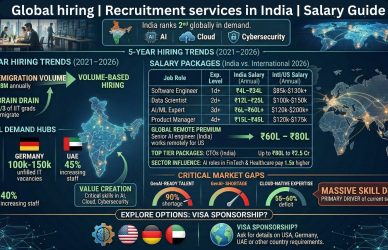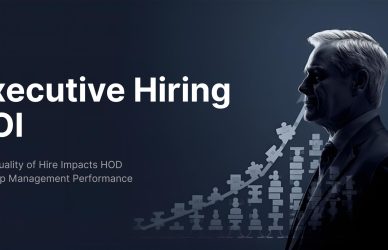Introduction to EOR Services: Adapting to the Modern Workforce
The Rise of a Global Workforce
The global workforce is experiencing unprecedented transformation as businesses increasingly tap into talent pools across borders. This shift is driven by advancements in technology, the growing demand for specialized skills, and the desire for a diverse workforce. In this context, Employer of Record (EOR) services have emerged as a vital enabler of cross-border talent acquisition, simplifying the complexities of international employment.
What Are EOR Services?
EOR services act as a bridge between businesses and their international workforce. By serving as the legal employer on behalf of companies, EOR providers manage critical aspects such as:
- Compliance with local labor laws
- Payroll processing and tax filing
- Employee benefits administration
- Visa and work permit facilitation
These services allow organizations to focus on operations while ensuring their global workforce is managed efficiently and legally.
The Impact of Remote Work on EOR Adoption
The remote work revolution, accelerated by the COVID-19 pandemic, has significantly influenced the adoption of EOR services. As companies embraced distributed teams, the need for compliant and flexible hiring solutions became paramount. EOR services enable businesses to onboard talent in different countries without the need to establish a physical presence, reducing costs and speeding up market entry.
Industries Leading the Demand for EOR Services
Certain industries have been at the forefront of leveraging EOR solutions to meet their talent needs:
Technology:
With the global tech talent shortage, companies use EOR services to hire developers, engineers, and IT specialists from talent-rich regions.
Healthcare:
EOR providers help healthcare organizations recruit specialized professionals across borders to address skill shortages in critical areas.
E-commerce:
Rapidly expanding e-commerce businesses rely on EOR services to manage their workforce in new markets while navigating compliance challenges.
EOR in 2024: A Strategic Necessity
In 2024, EOR services are no longer optional for companies aiming to compete in the global marketplace. They are a strategic necessity, offering businesses the ability to scale their operations seamlessly while ensuring compliance with varying labor laws and regulations. As organizations embrace the potential of a global workforce, EOR services continue to redefine how businesses approach international hiring and workforce management.

The Growing Demand for EOR Services in 2024
Global Expansion and Market Reach
In an increasingly interconnected world, companies are focusing on emerging markets to drive growth and innovation. EOR providers have become indispensable in this process, offering a streamlined way to hire and manage talent globally without the need to establish costly legal entities.
For instance, a tech company expanding into Eastern Europe can utilize an EOR to onboard developers while the provider handles compliance with local labor laws, payroll, and taxes. This allows businesses to test new markets quickly and adapt to shifting economic conditions without heavy upfront investments or administrative complexities.
Remote Work Proliferation
The remote work trend, accelerated by the COVID-19 pandemic, has transitioned from a temporary measure to a fundamental aspect of workforce strategies in 2024. Companies now prioritize accessing talent wherever it resides, and EOR services enable this shift by removing barriers to international hiring.
EOR providers handle the complexities of hiring remote employees, ensuring compliance with tax regulations, labor laws, and benefits administration. Businesses can focus on building high-performing teams across multiple countries without worrying about inconsistent payroll practices or legal complications. This flexibility is critical for organizations aiming to attract top talent while maintaining operational efficiency.
Navigating Regulatory Changes
The global regulatory environment is becoming increasingly intricate as countries implement stricter labor laws, data privacy measures, and worker protection regulations. Staying compliant across jurisdictions can be a daunting challenge for businesses, especially those with a global workforce.
EOR providers are experts in navigating these regulatory changes, ensuring that businesses adhere to local requirements. From managing statutory benefits to complying with data privacy laws like GDPR, EORs safeguard companies from potential fines and legal risks. This expertise not only mitigates compliance risks but also fosters trust and credibility in new markets.
Statistics Highlighting Growth
The growing reliance on EOR services is reflected in the industry’s rapid expansion. A recent market analysis projects the global EOR market to grow at a compound annual growth rate (CAGR) of 14% between 2023 and 2028. This growth is driven by various factors:
Industry Demand:
Sectors such as fintech, healthcare, and manufacturing are leveraging EOR services to address talent shortages and regulatory challenges.
Emerging Markets:
Businesses are increasingly expanding into regions like Southeast Asia, Latin America, and Eastern Europe, where EOR services provide a cost-effective solution.
Technological Advancements:
EOR providers are integrating advanced tools for payroll automation, compliance tracking, and workforce analytics, enhancing their appeal to businesses of all sizes.
Industries Driving the Surge in Demand
Fintech:
With global digitization accelerating, fintech companies use EOR services to hire experts in regulatory-heavy regions.
Healthcare:
EORs help address critical talent shortages in healthcare by enabling organizations to hire specialized professionals across borders.
Manufacturing:
Global supply chain diversification is pushing manufacturers to rely on EORs for workforce management in new regions.
Technology:
The tech sector continues to drive demand for EOR services to hire top talent in innovation hubs worldwide.
The Future of Workforce Management
As the global workforce evolves, the need for flexible, scalable, and compliant hiring solutions will only grow. EOR providers are at the forefront of this transformation, empowering businesses to expand internationally, embrace remote work, and navigate an increasingly complex regulatory landscape with confidence.

Key Trends Shaping EOR Services in 2024
Trend 1: Advanced Technology Integration
The integration of advanced technologies such as artificial intelligence (AI), machine learning, and automation is transforming the way Employer of Record (EOR) services operate. These technologies streamline processes, improve accuracy, and enhance efficiency in areas such as onboarding, payroll management, and compliance tracking.
For example, AI-powered tools can analyze complex regulatory environments and flag potential compliance risks in real time, enabling quicker resolutions. Automation simplifies repetitive tasks like payroll processing, reducing errors and freeing up resources for more strategic activities. Additionally, digital platforms supported by AI offer businesses better insights into workforce trends, helping them make informed decisions.
Trend 2: Customizable Solutions
As businesses across industries face unique challenges, EOR providers are moving away from rigid, one-size-fits-all models to offer more tailored solutions. Customization ensures that services meet the specific needs of various sectors and geographies.
For instance, a pharmaceutical company hiring across multiple countries may require compliance with stringent medical regulations, while a tech company might prioritize flexible hiring models for remote workers. By adapting their offerings to meet these diverse requirements, EOR providers deliver value-driven solutions that align with industry-specific demands.
Trend 3: Focus on Employee Experience
Employee satisfaction is becoming a critical focus for EOR providers, reflecting broader shifts in workforce priorities. Modern employees expect seamless access to benefits, accurate payroll processing, and efficient resolution of grievances.
EOR providers are adopting user-friendly platforms to enhance the overall employee experience. These platforms allow employees to access pay stubs, benefits, and HR support with ease. Mobile-first solutions are also gaining popularity, enabling workers to manage their information on the go. By improving employee satisfaction, EOR providers help businesses attract and retain top talent in competitive markets.
Trend 4: Emphasis on Sustainability
Environmental, Social, and Governance (ESG) principles are increasingly influencing corporate decisions, and EOR providers are aligning their services with these sustainability goals. This includes promoting ethical labor practices, ensuring fair wages, and implementing environmentally friendly policies.
EOR providers are also incorporating green initiatives, such as digital documentation to reduce paper usage and encouraging remote work to minimize carbon footprints. Businesses partnering with EORs that prioritize sustainability can enhance their ESG credentials, which is especially important for companies looking to appeal to environmentally conscious stakeholders.
Trend 5: Enhanced Data Security
With the rise of remote work and global hiring, the need for robust data security has never been greater. EOR providers handle sensitive employee information, including payroll data, tax records, and personal identification, making data security a top priority.
To address these challenges, EOR providers are implementing advanced cybersecurity measures such as blockchain technology and end-to-end encryption. These technologies ensure data integrity, prevent breaches, and comply with strict global data protection regulations like GDPR. By prioritizing data security, EOR providers not only protect businesses from potential risks but also build trust with their clients.
These trends illustrate how EOR services are evolving to meet the demands of a modern, globalized workforce. From leveraging cutting-edge technology to emphasizing sustainability and employee satisfaction, these advancements ensure that EOR providers remain at the forefront of workforce solutions in 2024.

How EOR Providers Are Evolving to Meet Future Needs
Expanding Geographical Reach
As global business landscapes continue to evolve, EOR providers are proactively expanding their geographical footprint. To address the needs of businesses seeking opportunities in untapped markets, such as Africa, Southeast Asia, and Latin America, EOR providers are forming partnerships with local HR experts and legal consultants.
This strategic expansion allows businesses to hire talent in emerging economies without navigating the complexities of establishing a local entity. For instance, a manufacturing company targeting Africa for its growth potential can onboard skilled workers through an EOR provider while ensuring compliance with local labor laws. By broadening their reach, EOR providers help organizations diversify their workforce and enter new markets with minimal risk and greater agility.
Leveraging Data Analytics
Data analytics is revolutionizing the way EOR providers support businesses. By harnessing the power of advanced analytics tools, EOR providers are enabling companies to make data-driven decisions that improve workforce management.
Analytics tools offer valuable insights into hiring trends, employee performance, and cost efficiencies. For example, a company can use data provided by an EOR to identify high-demand skill sets in specific regions or forecast hiring needs based on industry trends. Additionally, analytics help businesses optimize payroll management, reduce operational costs, and enhance workforce productivity. By integrating these tools into their services, EOR providers deliver a competitive edge to organizations navigating complex labor markets.
Specialization in Niche Industries
Recognizing the unique challenges of highly regulated industries, EOR providers are tailoring their services to cater to niche markets such as biotech, fintech, healthcare, and renewable energy. These industries often face stringent compliance requirements and specialized workforce needs, making generalized EOR services insufficient.
For example, a biotech firm expanding into a new region may need an EOR provider with expertise in local healthcare regulations, employee safety standards, and data protection laws. Similarly, fintech companies benefit from EOR providers who understand the complexities of financial compliance and data privacy. By offering industry-specific knowledge and customized solutions, EOR providers ensure businesses can operate confidently and effectively in challenging regulatory environments.
Integrating Technology for Scalability
To meet the demands of an increasingly digital and distributed workforce, EOR providers are adopting advanced technologies such as automation, cloud-based HR platforms, and artificial intelligence. These tools streamline processes like payroll management, compliance tracking, and employee onboarding, enabling EOR providers to scale their services for businesses of all sizes.
For instance, automation reduces administrative burdens by handling repetitive tasks, while AI-powered platforms enhance accuracy in compliance and payroll calculations. Cloud-based systems offer businesses real-time access to workforce data, allowing for greater transparency and collaboration. By integrating these technologies, EOR providers are not only improving operational efficiency but also positioning themselves as indispensable partners for modern businesses.
Strengthening Employee Support Services
As workforce expectations evolve, EOR providers are placing greater emphasis on enhancing employee support services. This includes developing intuitive platforms where employees can access benefits, payroll information, and HR support seamlessly.
EOR providers are also focusing on delivering personalized employee experiences, such as tailored onboarding processes and proactive communication channels. By addressing the needs of employees, EOR providers help businesses improve retention rates and foster a positive work culture. These enhancements reflect the growing importance of employee satisfaction as a key driver of business success in global markets.
Aligning with ESG Goals
EOR providers are aligning their strategies with Environmental, Social, and Governance (ESG) goals to meet the expectations of socially conscious businesses. This includes promoting ethical labor practices, reducing carbon footprints through remote work policies, and ensuring fair wages.
Businesses partnering with ESG-focused EOR providers gain reputational benefits and strengthen their commitment to sustainability and social responsibility. By integrating ESG principles into their services, EOR providers are meeting the future needs of businesses that prioritize long-term environmental and social impacts.
These evolutions reflect how EOR providers are adapting to a dynamic global landscape, empowering businesses to navigate challenges and seize opportunities effectively.

Industry Challenges and How EOR Services Address Them
Challenge 1: Cross-Border Taxation
One of the most complex challenges businesses face when expanding globally is navigating the intricacies of international tax regulations. Tax systems differ widely across countries, with varying rules on corporate tax, employee income tax, and social contributions. Missteps in compliance can lead to penalties, reputational damage, and operational disruptions.
How EOR Services Address Cross-Border Taxation
Employer of Record (EOR) providers streamline the management of international tax obligations. They handle tax filings, deductions, and social security contributions in compliance with local laws. For instance, a U.S.-based tech company hiring software developers in India can rely on an EOR to ensure all payroll taxes and statutory contributions are correctly managed. By leveraging local expertise, EOR providers minimize the risks associated with non-compliance and help businesses focus on growth rather than administrative burdens.
Challenge 2: Data Privacy and Security
The growing reliance on remote work and digital platforms has amplified the risks of data breaches and cyberattacks. For global businesses, ensuring the security of sensitive employee and company data while adhering to international data protection regulations like GDPR is a pressing challenge.
How EOR Services Enhance Data Privacy and Security
EOR providers implement robust cybersecurity measures, including encryption, secure data storage, and real-time monitoring, to protect sensitive information. Many providers are also adopting advanced technologies like blockchain to ensure data integrity. For example, a European healthcare company hiring remotely in Southeast Asia can trust an EOR to safeguard patient-related data while complying with GDPR and local privacy laws. These measures not only reduce risks but also instill confidence in businesses and their global workforce.
Challenge 3: Balancing Costs
While EOR services are generally cost-effective compared to setting up legal entities in multiple countries, budget constraints remain a challenge for many organizations, especially startups and small businesses. Balancing the need for high-quality services with affordability can be difficult.
How EOR Services Help Balance Costs
EOR providers offer scalable and customizable solutions that align with the financial capacity of businesses. For instance, they allow companies to start with basic services like payroll management and gradually expand to include benefits administration and compliance support as the organization grows. A case in point is a U.K.-based e-commerce startup that used an EOR to hire marketing professionals in Latin America, optimizing costs while maintaining operational efficiency. The ability to scale services up or down provides businesses with the flexibility to manage budgets effectively.
Case Studies: Overcoming Challenges with EOR Services
Tech Company Expanding to Asia
A U.S.-based software company wanted to hire developers in multiple Asian countries but struggled with the complexity of cross-border tax compliance. Partnering with an EOR provider helped the company manage tax filings, social contributions, and employee contracts seamlessly. The EOR’s expertise enabled the company to focus on project delivery while avoiding tax-related penalties.
Healthcare Organization Ensuring Data Security
A European healthcare provider aimed to expand its workforce in India but was concerned about GDPR compliance and data privacy risks. The EOR implemented stringent cybersecurity protocols, ensuring all employee and patient data was protected. This allowed the organization to scale operations while maintaining trust with stakeholders.
Startup Balancing Costs During Global Hiring
A Canadian startup sought to hire remote customer support agents in Africa but faced budget limitations. By choosing a scalable EOR solution, the company onboarded employees affordably and gradually expanded its services as revenue grew. The cost-efficient model allowed the startup to establish a global presence without financial strain.
These examples demonstrate how EOR services address industry-specific challenges, empowering businesses to navigate complexities in taxation, data security, and cost management effectively. Through tailored solutions and innovative practices, EOR providers remain essential partners for organizations seeking sustainable global expansion.

Case Studies: Success Stories of EOR Implementations in 2024
Case Study 1: Fintech Expansion into Asia
A U.S.-based fintech startup, known for its innovative digital payment solutions, aimed to expand its operations into Asia to tap into emerging markets such as India, Singapore, and Indonesia. However, the complexities of setting up legal entities and navigating diverse labor laws posed significant challenges.
The Role of EOR Services
By partnering with an EOR provider, the fintech startup successfully hired a local sales team in three countries without establishing subsidiaries. The EOR managed all aspects of compliance, payroll, and tax filings, ensuring the startup met local regulations. This allowed the company to focus on scaling its business operations and building relationships with key partners in the region.
Results Achieved
Reduced Setup Time: Expansion timelines were shortened by 70%, enabling faster market entry.
Cost Savings: The company avoided substantial expenses related to entity establishment and ongoing compliance management.
Improved Flexibility: The EOR’s scalable solutions allowed the startup to adjust its workforce size based on market performance.
Case Study 2: Remote Workforce Integration in Latin America
A global software firm headquartered in Europe sought to onboard a team of developers across Latin America to support its growing client base. The challenge was ensuring compliance with varying labor laws while maintaining a consistent employee experience.
The Role of EOR Services
The company partnered with an EOR provider specializing in Latin America. The EOR managed the hiring process, employee contracts, payroll administration, and benefits management, ensuring compliance with local regulations in countries like Brazil, Argentina, and Mexico. Additionally, the EOR provided a user-friendly platform for employees to access payroll and benefits information, contributing to high levels of satisfaction.
Results Achieved
Legal Compliance: The EOR ensured adherence to regional labor laws, avoiding potential legal issues.
Enhanced Employee Satisfaction: The streamlined onboarding and benefits management processes fostered a positive experience for the new hires.
Increased Productivity: By handling administrative tasks, the EOR allowed the software firm to focus on project delivery and client satisfaction.
Case Study 3: Retail Entry into African Markets
A multinational retail chain headquartered in the U.K. identified Africa as a strategic growth market due to its rising middle class and growing consumer demand. However, the legal and administrative complexities of establishing subsidiaries in multiple African countries were a significant barrier.
The Role of EOR Services
The retail chain partnered with an EOR provider experienced in navigating the African business landscape. The EOR handled the recruitment of store managers, customer service representatives, and logistics staff across key markets such as South Africa, Kenya, and Nigeria. The provider also managed compliance with regional labor laws, tax obligations, and employee benefits administration.
Results Achieved
Simplified Market Entry: The company avoided the time and cost-intensive process of setting up subsidiaries.
Risk Mitigation: The EOR ensured compliance with local labor and tax laws, reducing regulatory risks.
Operational Efficiency: The retail chain could focus on supply chain optimization and marketing strategies without being bogged down by administrative tasks.
These case studies highlight how EOR services are empowering businesses across industries to overcome expansion challenges and achieve operational excellence in 2024. By leveraging EOR expertise, companies can scale quickly, remain compliant, and deliver exceptional employee experiences in diverse global markets.

The Future of EOR Services Beyond 2024
Advanced Integration with Artificial Intelligence (AI)
Artificial intelligence is set to play a pivotal role in shaping the future of Employer of Record (EOR) services. AI-powered tools will enhance decision-making by analyzing workforce trends, predicting compliance risks, and automating repetitive HR tasks such as payroll and benefits management. These advancements will provide businesses with actionable insights, allowing for more strategic workforce planning. For instance, AI could streamline the process of identifying ideal global talent pools or detecting discrepancies in tax filings, ensuring smoother operations for businesses relying on EOR providers.
Wider Adoption of Blockchain Technology
Blockchain is expected to revolutionize data security and transparency in EOR services. With its decentralized and tamper-proof structure, blockchain can enhance trust in critical processes like payroll transactions and compliance documentation. This technology will enable secure, real-time cross-border payments, ensuring employees are compensated accurately and on time. Moreover, blockchain can provide immutable records of employee contracts and compliance adherence, offering businesses an added layer of security and accountability.
Increased Focus on Employee Well-Being
As employee satisfaction becomes a key driver of organizational success, EOR providers will increasingly prioritize initiatives to enhance employee well-being. Future EOR services may include comprehensive mental health support, personalized benefits programs, and tools to foster better work-life balance. By integrating these aspects into their offerings, EOR providers can help businesses attract and retain top global talent while ensuring high levels of engagement and productivity.
Support for Evolving Workforce Models
The workforce is shifting towards more flexible models, including hybrid work environments and the gig economy. EOR providers will adapt to support these trends by offering tailored solutions for freelance and contract workers, ensuring compliance with varying regulations. Additionally, EORs will likely incorporate technology that facilitates collaboration and communication across distributed teams, enabling businesses to thrive in increasingly decentralized workforce setups.
Expansion into New Markets
EOR providers are expected to broaden their reach into untapped regions such as Africa, Eastern Europe, and parts of Southeast Asia. These expansions will allow businesses to access new talent pools and seize opportunities in emerging markets, further solidifying the role of EOR services in global workforce management. By offering localized expertise, EOR providers will remain key enablers of business growth beyond 2024.

Conclusion: Embracing the Future of EOR Services
The evolution of EOR services reflects the shifting priorities of businesses in a globalized and technology-driven world. In 2024, EOR providers are not just facilitators but strategic partners enabling businesses to overcome challenges and seize opportunities in international markets. From integrating advanced technologies to offering tailored solutions, EOR services are setting the stage for a more agile, compliant, and employee-focused workforce.
As businesses continue to navigate the complexities of global hiring, EOR providers will remain a vital resource, empowering organizations to adapt to new trends and thrive in an ever-changing landscape. The future of work is here, and EOR services are at its helm, driving innovation and transformation.




